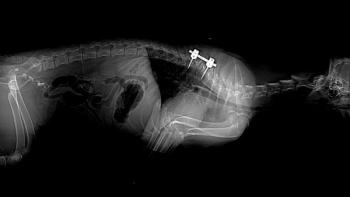
Research Update: Dexamethasone complications in disk disease treatment
Intervertebral disk disease (IVDD) is the most common neurologic disorder for which dog owners seek treatment.
Intervertebral disk disease (IVDD) is the most common neurologic disorder for which dog owners seek treatment. Therapies for affected animals have included glucocorticoids, muscle relaxants, and narcotic analgesics as well as decompressive surgical procedures. The efficacy and timing of drug and operative protocols are often debated in both human and veterinary patients.
In this retrospective case series involving 161 dogs with IVDD from two veterinary schools, the medical records of dogs receiving dexamethasone and surgery (43 cases) were compared with surgically treated dogs receiving other glucocorticoids (23 cases) or none at all (35 cases). In the other-glucocorticoid group, 17 dogs received methylprednisolone sodium succinate, and six were given prednisolone. Dogs receiving glucocorticoids were all treated within 48 hours of admission. No dog received a glucocorticoid while hospitalized in the university clinic.
Results indicated that dogs receiving dexamethasone were 3.4 times more likely to have diarrhea and 11.4 times more likely to have a urinary tract infection than the other two groups of dogs. No differences were seen in neurologic function among all groups at discharge or recheck evaluations. The authors concluded that using dexamethasone for surgically treated IVDD patients should be reconsidered.
COMMENTARY
The results of this study follow a trend in both human and veterinary medicine with regard to questioning the need and efficacy of administering glucocorticoids in patients with IVDD and documenting the complications of such administration. While limitations exist in evaluating data from a retrospective study involving numerous clinicians in different settings, the data are valuable in making veterinarians and clients aware of the risks of drug therapy for this condition. The study also revealed that although not statistically significant, the dexamethasone-treated dogs had a shorter hospitalization than dogs in the other two groups, and client costs were higher in the nontreatment group compared with other patients. Perhaps future prospective, blinded, and controlled studies will help resolve the therapeutic dilemma for clinicians.
Levine JM, Levine GJ, Boozer L, et al. Adverse effects and outcome associated with dexamethasone administration in dogs with acute thoracolumbar intervertebral disk herniation: 161 cases (2000-2006). J Am Vet Med Assoc 2008;232(3):411-417.
The information in "Research Updates" was provided by Veterinary Medicine Editorial Advisory Board member Joseph Harari, MS, DVM, DACVS, Veterinary Surgical Specialists, 21 E. Mission Ave., Spokane, WA 99202.
Joseph Harari, MS, DVM, DACVS
Newsletter
From exam room tips to practice management insights, get trusted veterinary news delivered straight to your inbox—subscribe to dvm360.




